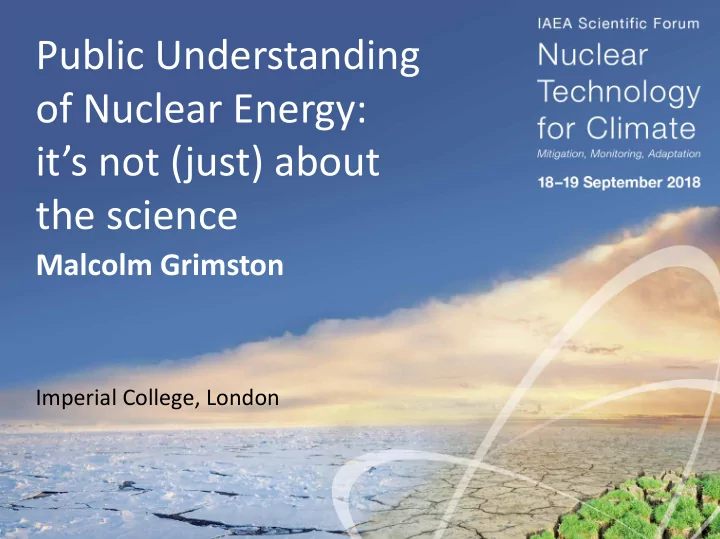

Public Understanding of Nuclear Energy: it’s not (just) about the science Malcolm Grimston Imperial College, London
A puzzle • Why is the safest large-scale energy source regarded as the most dangerous by significant numbers of people? • (How did Fukushima, a middle-ranking industrial accident of the kind that happens perhaps eight or ten times very year somewhere in the world, become a major human tragedy which is still happening?)
The usual ‘industry’ response • There is something wrong with the public – people are ‘ignorant’ or ‘irrational’ (or both). • Fill them up with ‘facts’ – by ‘education’, ‘information’ or perhaps ‘having an open two- way dialogue at them until they realise they are wrong’ – and their hearts and minds will follow. • After 60 years of pursuing this with a noted lack of success is it time to rethink?
Radiophobia? In Budapest in 2011 there was a brief public scare over the detection of • iodine-131 in airborne samples, with fears that it might have come from the Paks nuclear plant or another further afield. After investigation, however, it was found that the material had been released from the Institute of Isotopes from September 8 to November 16. At this there seems to have been a collective sigh of relief – it is not the dangerous (nuclear power) type of radioactive stuff but the nice kind, connected in some way with medicine. No ‘radiophobia’ in medicine, air travel, natural radon, the death of Mr • Litvinenko in London using Po-210 etc. etc. Something about the way radiation in the nuclear power context is • communicated has created an exaggerated fear among rational, intelligent lay people which is not there in other contexts.
Who is the more rational? ‘Radioactive waste is not very dangerous but we are going to bury it 800 metres underground.’ Industry’s irrational belief – people will be reassured by this. Public’s rational response – this is the most dangerous stuff mankind has ever produced (we don’t bury anything else 800 metres underground), so we should be scared. And what’s more these jokers must think we are idiots if they expect us to believe it is not very dangerous at all, so we won’t believe them ever again. Help! 5
Who is the more rational? ‘Safety is the top priority.’ Industry’s irrational belief – people will be reassured by this. Public’s rational response – if safety really is more important than generating electricity or cost, for example, then why not just stop doing it? This is incomprehensible – what do these people really think? Help! 6
Who is the more rational? ’Over 100,000 people cannot return to their homes near Fukushima because we are ‘erring on the safe side’.’ Industry’s irrational belief – people will be reassured by this. Public’s rational response – radiation must be hugely dangerous or they would not be destroying our lives by keeping us from our homes. A nuclear accident must be the worst thing that can possibly happen. So obviously we can’t risk reopening existing nuclear stations in case this happens again. 7
Attitude to nuclear new build in the UK To what extent would you support or oppose the building of new nuclear power stations in Britain TO REPLACE those which are being phased out over the next few years? This would ensure the same proportion of nuclear energy is retained. Source: YouGov 2014
EDF advertising campaign 2015/2016 9
A final thought • Better communication – e.g. not putting such an emphasis on ‘safety’ – would undoubtedly help to put nuclear power into a proper perspective. • The industry and its regulators continue to talk about and treat nuclear power and radiation as if they are vastly more dangerous than they actually are. This appears to be driven by the bizarre hope that this will put people’s minds at rest rather than inevitably doing precisely the opposite. It can be argued that the only truly irrational members of the public will be convinced.
Recommend
More recommend